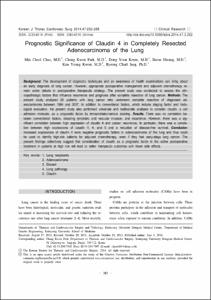KUMEL Repository
1. Journal Papers (연구논문)
1. School of Medicine (의과대학)
Dept. of Thoracic & Cardiovascular Surgery (흉부외과학)
Pronostic Significance of Claudin 4 in Completely Resected Adenocarcinoma of the Lung
- Keimyung Author(s)
- Park, Chang Kwon; Keum, Dong Yoon; Hwang, Il Seon; Kwon, Kun Young; Jang, Byeong Churl
- Department
- Dept. of Thoracic & Cardiovascular Surgery (흉부외과학)
Dept. of Pathology (병리학)
Dept. of Molecular Medicine (분자의학)
- Journal Title
- Korean Journal of Thoracic and Cardiovascular Surgery
- Issued Date
- 2014
- Volume
- 47
- Issue
- 3
- Keyword
- Lung neoplasms; Adenocarcinoma; Discard; Lung pathology; Claudin
- Abstract
- Background: The development of diagnostic techniques and an awareness of health examinations can bring about
an early diagnosis of lung cancer. However, appropriate postoperative management and adjuvant chemotherapy remain
under debate in postoperative therapeutic strategy. The present study was conducted to assess the clinicopathologic
factors that influence recurrence and prognosis after complete resection of lung cancer. Methods: The
present study analyzed 62 patients with lung cancer who underwent complete resection of diagnosed adenocarcinoma
between 1994 and 2007. In addition to conventional factors, which include staging factor and histological
evaluation, the present study also performed univariate and multivariate analyses to consider claudin, a cell
adhesion molecule, as a prognostic factor by immunohistochemical staining. Results: There was no correlation between
conventional factors, including lymphatic and vascular invasion, and recurrence. However, there was a significant
correlation between high expression of claudin 4 and cancer recurrence. In particular, there was a correlation
between high expressions of claudin 1, 4, and 5 and a reduction of disease-free survival. Conclusion:
Increased expressions of claudin 4 were negative prognostic factors in adenocarcinoma of the lung and thus could
be used to identify high-risk patients for adjuvant chemotherapy, even if they had early-stage lung cancer. The
present findings collectively suggest that consideration of claudin as a prognostic factor in the active postoperative
treatment in patients at high risk will lead to better therapeutic outcomes with fewer side effects.
- Publisher
- School of Medicine
- Citation
- Min Cheol Chae et al. (2014). Pronostic Significance of Claudin 4 in Completely Resected Adenocarcinoma of the Lung. Korean Journal of Thoracic and Cardiovascular Surgery, 47(3), 262–268. doi: 10.5090/kjtcs.2014.47.3.262
- Type
- Article
- ISSN
- 2233-601X
- 파일 목록
-
-
Download
 oak-bbb-4212.pdf
기타 데이터 / 328.7 kB / Adobe PDF
oak-bbb-4212.pdf
기타 데이터 / 328.7 kB / Adobe PDF
-
Items in Repository are protected by copyright, with all rights reserved, unless otherwise indicated.